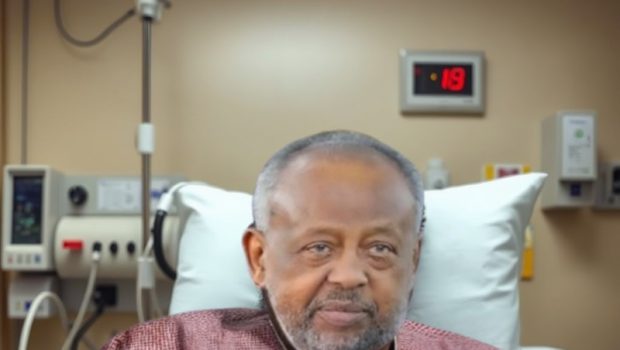State of health, rumours and political uncertainties
Since 20 September 2024, the President of Djibouti, Ismaïl Omar Guelleh, has been the subject of much speculation and rumour about his state of health. The 77-year-old Guelleh, who has been in power since 1999, was taken to Paris for medical treatment at the American Hospital in Neuilly-sur-Seine. This evacuation immediately raised many questions among both the Djiboutian population and the international media, particularly those in Somaliland, about the seriousness of his condition.
Official versions and rumours
The Djibouti authorities quickly sought to calm public opinion by claiming that Ismaïl Omar Guelleh was travelling to France for a knee problem. However, this explanation was not enough to dispel speculation, especially as rumours from Somaliland claimed that the President was clinically dead. Some media outlets relayed this information, claiming that his state of health was much more critical than the official versions suggested.
In response to this situation, the Djibouti presidency published a video yesterday evening, Monday 30 September 2024, at around 6pm, showing the presumed arrival of Ismaïl Omar Guelleh at Djibouti airport. This publication was no doubt intended to allay doubts and show that the President is indeed alive and in better health. However, the video was quickly called into question by some media and observers, who claimed that it was an old video, probably reedited to reassure the population.
A conspicuous absence at the Council of Ministers meeting on Tuesday 1 October 2024.
Today, another sign of trouble appeared. Ismaïl Omar Guelleh was expected to chair the Council of Ministers, but he was not present. Instead, his prime minister led the meeting, a rare and significant occurrence. The President’s absence from this crucial session has heightened speculation about the seriousness of his state of health. Indeed, Guelleh is known for his firm grip on the reins of power, and such an absence is seen as a worrying sign by many observers.
The fact that the Prime Minister took charge of this meeting could be interpreted as a gesture of government continuity. It could also indicate that the authorities are preparing for a possible power vacuum, although nothing has been officially confirmed at this stage.
Political issues surrounding the president’s state of health
The prolonged absence or deteriorating health of Ismaïl Omar Guelleh has major implications for Djibouti’s political stability. This strategic country in the Horn of Africa, home to several foreign military bases (notably American and French), depends to a large extent on the stability of its regime to maintain its geopolitical position.
Guelleh, who has been in power for more than two decades, has managed to centralise decision-making around himself and his family. His sudden withdrawal or inability to continue governing could plunge the country into a period of political uncertainty, or even a power struggle. Several figures in his government or in his entourage could seek to assert themselves in a possible transition, creating internal tensions.
The future of power in Djibouti
For the moment, no official succession plan has been announced, although speculation has been rife. However, a change of leadership in Djibouti, especially under such unclear and precipitous conditions, could lead to rivalries within the political and military elites and with the players lurking in the shadows for the time being.
The mystery surrounding Ismaïl Omar Guelleh’s state of health is therefore far from over. While contradictory information is circulating, the situation remains uncertain, and much will depend on the next official communications. If the video published yesterday by the presidency was indeed old, it could be a sign that the President is in a more serious condition than announced. The absence of a leader as centralised as Guelleh could lead to a delicate period of political transition in Djibouti, a country whose stability is crucial for the region.
Conclusion
As speculation continues and uncertainties mount, Djibouti is entering a phase of political vulnerability. Ismaïl Omar Guelleh’s absence from today’s Council of Ministers meeting only reinforces doubts about his actual state of health. The next few days will be decisive for the country’s future, both nationally and internationally. The silence or contradictions of the Djibouti authorities will only add to the concern, at a time when the stability of this small strategic state in the Horn of Africa is more crucial than ever.
Hassan Cher















